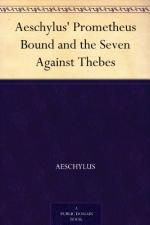|
This section contains 4,568 words (approx. 12 pages at 400 words per page) |

|
Tucker introduces the play by discussing its structure, as well as the history of the time.
Though we do not demand of a modern drama that it should convey a definite moral or political lesson, and though we should not be too exacting in this respect when we deal with the corresponding form of art in antiquity, it is nevertheless a notorious truth that the early Greek poet, and not least the dramatic poet, was commonly regarded and regarded himself as an exponent of religious, ethical, and political wisdom. In its primary purpose a tragedy was doubtless a composition of art, intended for the public entertainment on its more serious side; but it was meanwhile expected of the tragedian that he should 'improve the occasion' and play the part of teacher to the audience. The stage Euripides is not expressing simply his individual opinion, when he maintains...
|
This section contains 4,568 words (approx. 12 pages at 400 words per page) |

|




